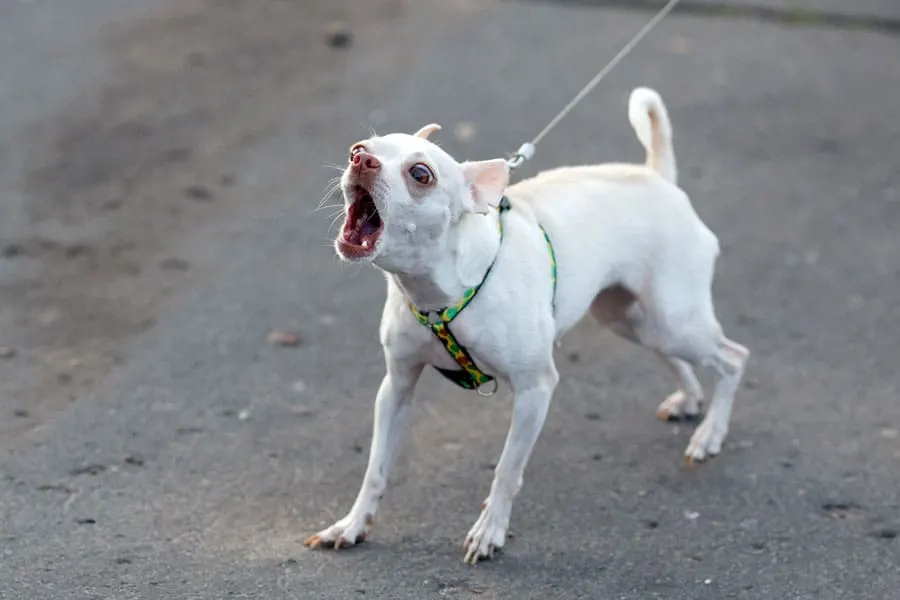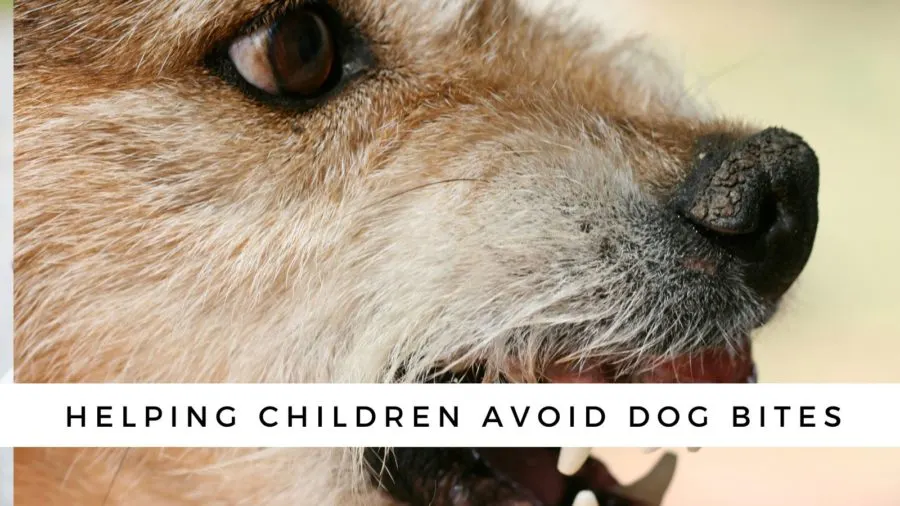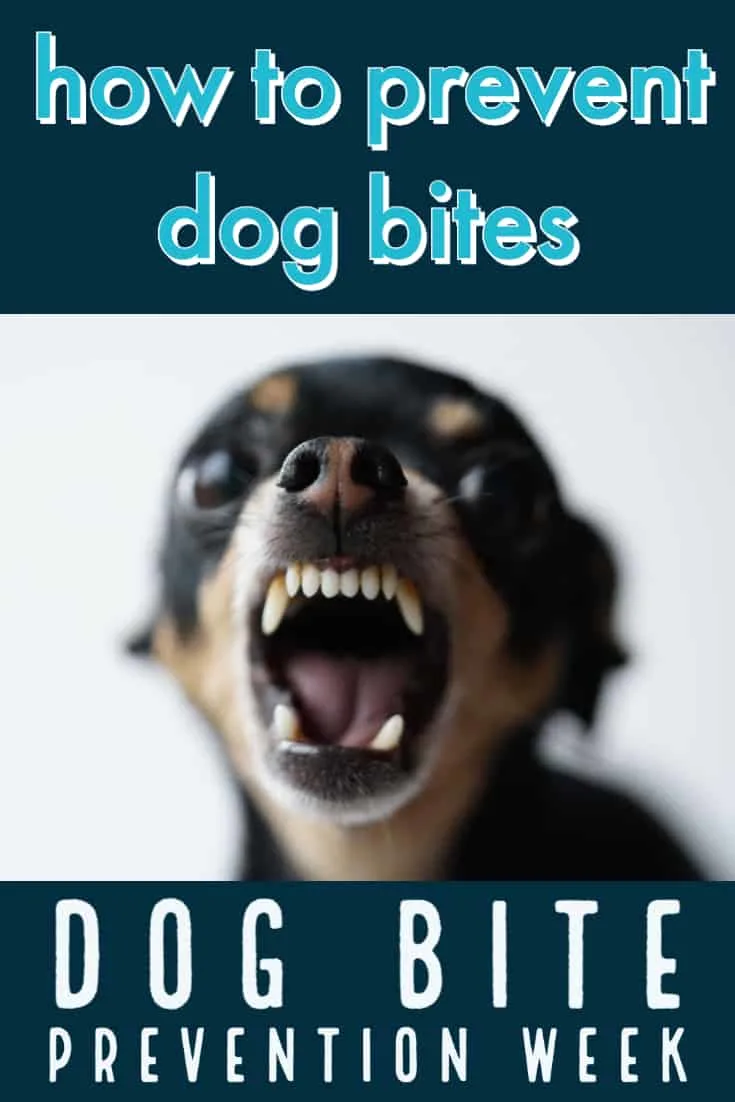Even the most docile dog can lash out when feeling frightened, hurt, confused or provoked, leading to a nightmare scenario for the injured party, the pet parent and their canine companion. National Dog Bite Prevention Week are National Dog Bite Awareness Week are important times to take a few minutes and consider if there are any steps you can take in your daily life to help make sure you and your dog are not among the 4.5 million dog bites in the US annually.

When is National Dog Bite Prevention Week and National Dog Bite Awareness Week?
National Dog Bite Awareness Week is the first full week in June. It is an initiative founded by the US Postal Service.
National Dog Bite Prevention Week is observed the second full week in April. The American Veterinary Medical Association (AVMA) established this annual pet holiday as education is key to combating any crisis.
The American Veterinary Medical Association (AVMA) is joined by Animal Planet’s Victoria Stilwell, the United States Postal Service (USPS), pediatricians, plastic surgeons and representatives of the insurance industry in offering tips to prevent dog bites.
Victoria Stilwell explained, “Dogs need and want us to provide effective leadership, but the most effective leaders do not simply impose their will on their followers,” says Stilwell. “And I firmly believe the only way to truly ensure that we are successful in achieving the necessary balance with our dogs is by using positive reinforcement and treating them with the same respect that we ask of them. It’s not the breed of the dog or breed mix that causes the bite, but rather how well the dog is trained and controlled.
6 Reasons Why Dogs Bite
First, it’s important to recognize WHY dogs bite. New York Walk & Train‘s Colleen Safford, named “Best of NY” by New York Magazine, give us these reasons why dogs bite.

There’s a whole host of reasons dogs may bite. I see a lot of behavior fallout resulting from a lack of early positive exposure, experience and comfort of being handled.
Dogs who lack impulse control (or the ability to think before think act) are also at risk of behavior issues. Impulsive antics such as jumping, barking, bolting through doors and racing at fences can lead to volatile situations.
Quickly these situation go from displays of excitement – which is often discouraged by the owner and possibly punished – to frustration. Over time, frustration for our dogs can translate to aggression.
In talking about bite prevention, it’s never too late to start addressing and understanding a behavior problem, but you can PREVENT a lot of behavior problems by investing in solid training early on.
Training dogs and people to understand and interact harmoniously is the key!
It is so important for the mental health of your dog (and you!) to select a trainer that will work together with both of you humanely.
The techniques demonstrated should be something that YOU can use consistently each and every day throughout the day.
If your dog exhibits the behaviors below, it is very important to consider training him or her to become more comfortable. There are numerous books and positive trainers out there that can help you tackle these issues.
Resource Guarding

This is when a dog takes possession of an item and is unwilling to share it or even have anyone in close proximity of him while he has it.
This could be food in a food dish, a toy, a chewy or a bed; and when laying on it the dog will not allow someone to approach.
The dog may also resource guard a human. If the dog is sitting in an owner’s lap, it will not allow others to approach the human. This dog is not thinking that he is keeping the person safe, but rather keeping his main possession that gives him everything in life to himself.
Handling Sensitivity
A dog who has trouble being touched a particular parts of body. Could be paws, ears, eyes, mouth.
This dog becomes upset during grooming, medical or general body exams, medicine administering, and petting to areas where he is not comfortable.
Pain
If a dog is sick or in pain, he may be sensitive overall or to a particular part of his body.
Fearful/Startled
If a dog is sleeping and woken suddenly by someone who is right there in his face (even if just for a kiss!), a dog who is uncomfortable being handled by humans or strange humans.
A dog who is fearful of particular things–children, people wearing hats, people carrying bags. Some dogs are fearful of a particular type of person.
Inappropriate handling
Children are our number one culprits in this category. They may poke at, grab at, pinch or step on our furry friends.
It’s not intentional in most cases, it’s the result of undeveloped motor skills.
Again, there is more to bit prevention than supervision, but always supervising a child’s interactions with children is important.
Redirection

This dog may have an issue with something else, like other dogs. While on the leash the dog becomes agitated and bites the first thing he can get his mouth on, usually the leg or hand of his handler.
This might happen inside the home when a dog sees someone approaching the home and the owners goes to touch dog to hold him back from the door.
Tips for Avoiding Dog Bites
Whether you are out daytripping with your dog, taking a walk around your neighborhood or just greeting visitors to your home, American Humane Association has some tips for dog owners on avoiding dog bites.
- Pet parents of puppies must teach socialization skills so the dog will feel more at home among other people and pets.
- Never put a dog in a situation which will make him or her feel threatened.
- Walk or jog with your dog, as regular exercise will help to maintain both the physical and mental health of your barking buddy.
- Always walk your dog on a leash while in public.
- Visit your veterinarian regularly, as a dog who is ill or injured is more apt to strike out at people.
- Caution people who approach your dog. Strangers should always wait before petting any dog in order to give the dog time to familiarize themselves with the unknown person on their terms.
The AVMA, which partnered with the USPS one year to raise awareness (did you know almost 6,000 postal carriers are bitten every year?) also adds these additional tips for owners:
- Obedience training can teach dogs proper behavior and help owners control their dogs.
- When a carrier comes to your home, keep your dog inside, away from the door in another room.
- Dogs can be protective of their territory and may interpret the actions of letter carriers as a threat. Please take precautions when accepting mail in the presence of your pet.
- Spay or neuter your dog. Neutered dogs are less likely to roam and bite.
- Dogs that receive little attention or handling, or are left tied up for long periods of time, frequently turn into biters.
How to Avoid Getting Bitten
AVMA also shares these tips:
- Don’t run past a dog. The dog’s natural instinct is to chase and catch you.
- If a dog threatens you, don’t scream. Avoid eye contact. Try to remain motionless until the dog leaves, then back away slowly until the dog is out of sight.
- Don’t approach a strange dog, especially one that’s tethered or confined.
- People choosing to pet dogs should obtain permission from the owner first and always let a dog see and sniff them before petting the animal.
- If you believe a dog is about to attack you, try to place something between yourself and the dog, such as a backpack or a bicycle.
Keeping Postal Carriers from Being Bitten
National Dog Bite Awareness Week brings attention to the fact that over 5,300 Postal Service employees are attacked by dogs every year while delivering mail. While the pet awareness week only lasts seven days, we all know that this is a worry that USPS employees face daily.
Dogs are generally protective of their turf and dog owners have an important responsibility to control them to ensure safe mail delivery. “When letter carriers deliver mail in our communities, dogs that are not secured or leashed can become a nemesis and unpredictable and attack,” said Leeann Theriault, USPS employee safety and health awareness manager. “Help us deliver your mail safely by keeping your dog secure and out of the way before your carrier arrives.”
Steps you can take to keep your dog and the mail carrier safe include doing the following options when the mail carrier arrives:
- keep your dog inside the house or behind a fence
- keep your dog away from the door or in another room
- keep your dog on leash
Pet owners also should remind children not to take mail directly from a letter carrier as the dog may view the carrier as a threat to the child.
Helping Children Avoid Dog Bites

“Veterinarians recognize, while there are 72 million good dogs in the United States, any dog can bite if it is frightened or feels threatened, even the family pet. Unfortunately, children are most often the victims,” says Dr. Larry M. Kornegay, of the AVMA Executive Board.
Bite injuries occur most often among children between ages 5 and 9 years old. In victims younger than 18 years old, the family dog inflicts 30 percent of all dog bites, and a neighbor’s dog is responsible for another 50 percent of these bites.
Children should be reminded to always abide by the following safety rules:
- Never approach any dog with whom they are unfamiliar, or any dog they may know if the dog is unaccompanied by their pet parent.
- Always ask for permission from a pet’s guardian before petting a dog.
- Do not approach any animal who shows signs of injury or illness. If a child feels that a dog requires assistance, he or she should tell an adult.
- Never approach a dog who is sleeping, eating, playing with their toy or caring for puppies.
- Never provoke a dog through teasing, poking, pinching or pulling.
The American Veterinary Medical Association offers a number of in-depth articles regarding bite prevention, ranging from reasons why Rover might bite to reading a dog’s body language. A downloadable Dog Bite Prevention brochure is also available.
Combining education with entertainment, the American Veterinary Medical Association has created several episodes of Jimmy’s Dog House, which highlights some of the actions to avoid when associating with a dog:
Keeping Utility Workers Safe from Dog Bites
We don’t have meter readers at our home (that’s a nice thing about country living…we read our own electrical meter and mail in the reading) but we do have a lot of deliveries.
We post “Beware of Dog” signs just to let delivery people and anyone else know that we have dogs on our property, just so there are no surprises.
Of course, socialization and training are the best steps to preventing dog bites. What else can you do to help make sure that utility workers, repairmen, and others come and go from your property safely?
We’ve got some tips here from Southern California Gas Co.; they know firsthand about the danger of dog bites since, although children are the most common victims of dog bites, utility workers are second.
Here are their suggestions:
- Securely confine or relocate your dog during scheduled customer service visits and when it’s time for utility employees to read your meter.
- Contact your local utilities or check your monthly bills for the dates when utility workers are scheduled to conduct meter readings. On those days, leave gates unlocked and keep your dogs or other pets securely confined in another section of the property.
- If the employee is outside, keep your dog securely confined inside. If the employee is inside, keep your dog securely confined outside. Dogs may become more protective in the presence of their owners. Make sure your dog is securely confined where it cannot come into contact with the utility employee.
- Post a Beware of Dog sign on your fence or house to avoid any surprises.
- Leave a note on your meter explaining that you have a dog and how and where it is confined.
- Be sure all vaccinations and inoculations for rabies and parasites are up to date.
- Train your dog to obey simple commands like “sit,” “stay,” “no” and “come.” Obedience training can teach dogs proper behavior and help owners control their dogs in any situation.
- Collar your dog, so you have the means to quickly restrain your dog in any emergency.
- If you get a new dog, contact your local utilities to let them know.
More Pet Holidays
Pin it To Remember National Dog Bite Prevention Week

- Arthur The King Movie Showcases Rescue of Stray Dog - March 12, 2024
- 2024 Bark in the Park Major League Baseball Games - March 11, 2024
- Meghan Markle Celebrates Shelter Expansion - February 22, 2024
